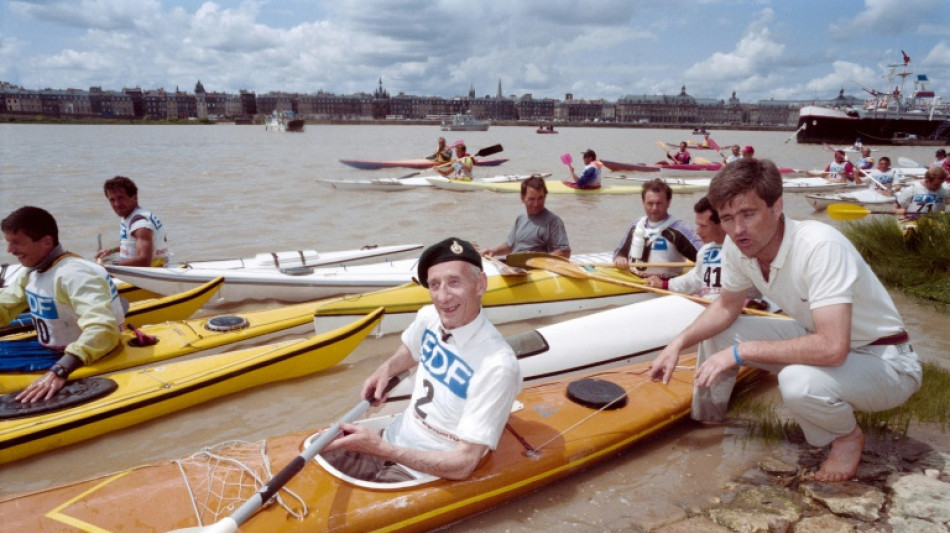
-
 UN nuclear chief in Iran to 'reach diplomatic solutions'
UN nuclear chief in Iran to 'reach diplomatic solutions'
-
Israel face France in Paris football match under tight security

-
 Beijing's fears after Trump fills key posts with China hawks
Beijing's fears after Trump fills key posts with China hawks
-
Man with explosives dies trying to enter Brazil's Supreme Court

-
 South Korea exam sees record number of re-takes after medical reforms
South Korea exam sees record number of re-takes after medical reforms
-
Asian markets mixed as traders weigh Fed; bitcoin above $90,000

-
 Pumas seek historic win over 'hurt' Irish
Pumas seek historic win over 'hurt' Irish
-
Advantage Martin as MotoGP reaches gripping climax in Barcelona

-
 Man with explosives dies trying to enter Brazil Supreme Court
Man with explosives dies trying to enter Brazil Supreme Court
-
Mike Tyson, 58, back in ring to face Youtuber Paul

-
 Hunger in G20 host Brazil is Lula's unfinished fight
Hunger in G20 host Brazil is Lula's unfinished fight
-
Biden, Xi arrive in Peru ahead of face-to-face at Asia-Pacific summit

-
 Mysterious diamond-laden necklace fetches $4.8 mn in Geneva auction
Mysterious diamond-laden necklace fetches $4.8 mn in Geneva auction
-
Lawmakers clash, protesters arrested in wake of Amsterdam violence

-
 Global diabetes rate has doubled in last 30 years: study
Global diabetes rate has doubled in last 30 years: study
-
Six Israeli troops killed, deadly strikes in Lebanon

-
 US envoy says Mexico's 'hugs not bullets' strategy failed
US envoy says Mexico's 'hugs not bullets' strategy failed
-
Lyon and Chelsea stay perfect in Women's Champions League

-
 Alcaraz beats Rublev to open ATP Finals account, Ruud misses last four chance
Alcaraz beats Rublev to open ATP Finals account, Ruud misses last four chance
-
Another clean sheet for Onana as E. Guinea, I. Coast qualify

-
 From 'Little Marco' to 'Mr Secretary': Rubio shows Trump China push
From 'Little Marco' to 'Mr Secretary': Rubio shows Trump China push
-
Sri Lanka president eyes parliament win in snap election

-
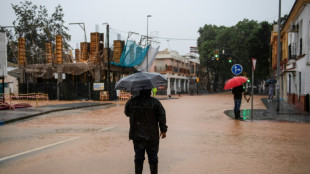 Spain flood epicentre braces for fresh deluge
Spain flood epicentre braces for fresh deluge
-
New York drought conditions fan flames, spur water saving

-
 Football 'world order' is changing, says Brazil coach
Football 'world order' is changing, says Brazil coach
-
Maiden century by Varma gives India unbeatable series lead

-
 Buy now, pay later: Latin America pressured by Chinese online shops
Buy now, pay later: Latin America pressured by Chinese online shops
-
Republicans complete power takeover with House majority

-
 Kane disappointed by England Nations League withdrawals
Kane disappointed by England Nations League withdrawals
-
Trump victory signals golden era for crypto industry

-
 'First Buddy': Musk takes unusual star role with Trump
'First Buddy': Musk takes unusual star role with Trump
-
Workers stage walkout at US maker of Fallout video game

-
 England will not change 'DNA' against South Africa, says Slade
England will not change 'DNA' against South Africa, says Slade
-
Sri Lanka beat New Zealand to go 1-0 up in ODI series

-
 Biden, Xi to meet in Peru on Saturday: US official
Biden, Xi to meet in Peru on Saturday: US official
-
Spurs coach Popovich suffered 'mild stroke', says NBA team

-
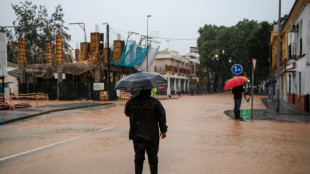 Spain flood epicentre under highest alert for fresh rain
Spain flood epicentre under highest alert for fresh rain
-
Turkey scrubs up its baths to keep hammam tradition alive

-
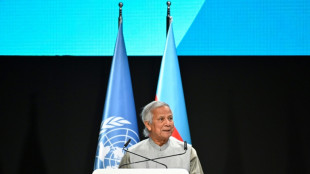 'Very humiliating': Bangladesh's Yunus seethes over climate cash fight
'Very humiliating': Bangladesh's Yunus seethes over climate cash fight
-
'Welcome back': Trump, Biden shake hands in White House

-
 Tech's green wave hits choppy waters
Tech's green wave hits choppy waters
-
Fernandes hopes Amorim can 'change the energy' at Man Utd

-
 Trump, Biden shake hands in White House, vow smooth transfer
Trump, Biden shake hands in White House, vow smooth transfer
-
Gatland battling 'pain' during tough Wales rebuild

-
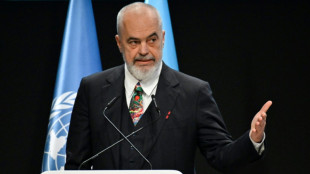 COP29 fight for climate money 'humiliating': Bangladesh's Yunus
COP29 fight for climate money 'humiliating': Bangladesh's Yunus
-
McIlroy aims for glory on happy hunting ground in Dubai

-
 Spain evacuates thousands in fresh flood alarm
Spain evacuates thousands in fresh flood alarm
-
US death row inmate stages jazz protest for release in London court
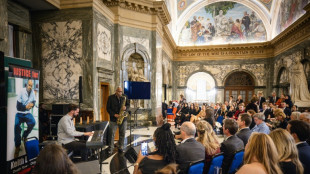
-
 Markets stall, inflation and bitcoin rise amid Trump fears
Markets stall, inflation and bitcoin rise amid Trump fears
-
Germany's embattled Scholz trades blows with rivals as election looms


80 years since daring 'cockleshell' raid on Nazi ships in France
France marks next week the 80th anniversary of a daring World War II raid by British Royal Marines, who slipped past German patrols up the Gironde estuary to mine crucial supply ships.
Dubbed "The Cockleshell Heroes" in a 1950s book and film after their tiny canvas-and-plywood boats, the 10-man infiltration team set off on "Operation Frankton" on December 7, 1942.
Faces blackened against detection, they slipped from a submarine near the entrance to the estuary for a 100-kilometre (60-mile) moonlight paddle trek that would take several nights to complete, resting on the banks by day.
Their mission was to sink ships moored in the port of Bordeaux that had been running arms and raw materials between German and its ally Japan.
That objective complete, the commandos would then have to make their own way another 160 kilometres overland to a meeting with resistance fighters, who would smuggle them into Vichy France.
Historian Robert Lyman dubbed the attack "Operation Suicide" in a 2012 book.
Although young -- the men under the command of Major Herbert Hasler were mostly in their early 20s -- the unit scored a resounding success, blasting five ships in the early hours of December 12.
But only Hasler himself and his boat mate William Sparks made it home alive four months later, after fleeing on foot, by bicycle and on trains to Gibraltar.
- 'The Germans were everywhere' -
Six members of the team died before even they even reached the target.
Two men, George Sheard and David Moffat, drowned off the French coast, with Sheard's body never found.
Swells capsized the boat of Samuel Wallace and Robert Ewart, who were captured and shot by the Germans -- as were John MacKinnon and James Conway, taken after their boat was holed near Bordeaux.
After the attack, French informants gave up Alfred Laver and William Mills to the occupiers as they were trying to make their way home. Their names are on a war memorial in the village of Montlieu-La-Garde.
Around 20 plaques around the region recall the commando raid, says Erik Poisneau, president of the Frankton Souvenir (Frankton Memory) association.
The attack was "a physical and nautical feat" pitting the marines against the natural forces of Europe's largest estuary, Poisneau says.
Although "the Germans were everywhere", it had been "unthinkable" for them that the Allies would even attempt such a raid, he adds.
For historian Sebastien Albertelli, the mission had a "psychological, propaganda dimension" for the British. It showed that London could "strike at the heart of the enemy forces" at a time when the tide of the war had yet to clearly turn.
- 'The chicken is tasty' -
After placing their mines and scuttling their kayaks downstream, the exfiltration became "just as extraordinary as the mission itself," says Christophe Soulard, author of "Frankton: the Unbelievable Odyssey".
Navigating with map and compass with a few francs in their pockets, Hasler and Sparks crossed the river Charente. But while some locals welcomed them, others were hostile.
One farmer who put them up, Clodomir Pasqueraud, asked them to have the words "the chicken is tasty" broadcast on the BBC when they return -- code to let those who had helped them know they had made it back safely.
In one village, three people including a 16-year-old boy were sent to the concentration camps for helping the British commandos.
"They never came back," says Monique Babin, an expert on the operation who has become an associate member of Britain's Special Boat Service Association.
A restaurateur who put them up asked for another poultry-based BBC message -- "the two chickens have arrived" -- and both were transmitted in April 1943 after Hasler and Sparks were helped to Gibraltar by the "Marie-Claire" resistance network.
Neither man had fired a shot during the whole operation.
Known as "Blondie" for the colour of his bushy moustache, Hasler became a well-known sport sailor, launching and competing in the first solo transatlantic race.
Having joined up to avenge his brother's death in combat, Sparks became a trolleybus driver after the war, but fell on hard times and had to sell his medals at auction.
O.Norris--AMWN
